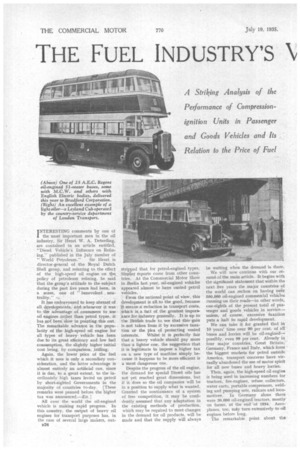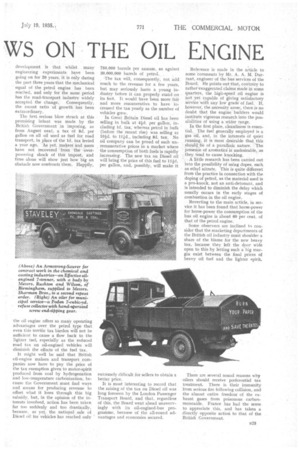THE FUEL INDUSTRY'S \
Page 34

Page 35

If you've noticed an error in this article please click here to report it so we can fix it.
WS ON THE OIL ENGINE
A Striking Analysis of the Performance of Compressionignition Units in Passenger and Goods Vehicles and Its Relation to the Price of Fuel
INTERESTING comments by one of 1 the most important men in the oil industry, Sir Henri W. A. Deterding, are contained -in an article entitled, "Diesel Vehicle's Influence on Refining," published in the July number of " World Petroleum." Sir Henri is director-general of the Royal Dutch Shell group, and referring to the effect of the high-speed oil engine on the policy of petroleum refining, he said that the group's attitude to the subject during the past five years had been, in a sense, one of "benevolent neutrality." • .
It has endeavoured to keep abreast of all devdopMents,: and_whenever it was to the advantage ofconsumers to use oil engines rather than petrol types,, it has not been slow in pointing this out. The remarkable advance in the popularity of the high-speed oil engine for all types of heavy vehicle has been due to its great efficiency and low fuel consumption, the slightly higher initial cost being, by comparison, trifling.
Again, the lower price of the fuel which it uses is only a secondary consideration, and the latter advantage is almost entirely an artificial one, since it is due, to a great extent, to the inordinately high taxes levied on petrol by short-sighted Governments in the majority of countries to-day. [These remarks were penned before the higher tax was announced.—ED.] All ever the world the oil-engined vehicle is making rapid progress. In this country, the output of heavy oil engines for transport purposes has, in the case of several large makers, out
1324
stripped that for petrol-engined types. Similar reports come from other countries. At the Commercial Motor Show in. Berlin last -year, oil-engined vehicles appeared almost to have ousted petrol vehicles.
From the national point of view, this development 15 all to the good, because it means a reduction in transport costs, which is .a fact of the greatest import.mice for:industry generally. It is up to the British trade to set that thisgain is not taken from it by excessive taxatio.n or the plea of protecting vested
interests. Whilst it is perfectly fair that a heavy vehicle should pay more than .a lighter one, the suggestion that it is legitimate to impose a higher tax ona new type of machine simply because it happens to be more efficient is a most dangerous one.
Despite the progress of the oil engine, the demand for special Diesel oils has not yet reached great dimensions, but if it does so the oil companies will be in a position to supply what is wanted. Granted the continuance of a system of free competition, it may be confidently assumed that any adaptation in the existing methods of production, which may be required to meet changes in the demand for oil products, will be made and that the supply will always be waiting when the demand is there.
We will now continue with our resume of the main article. It begins with the significant statement that within the next five years the major countries of the world can reckon on having over 500,000 oil-engined commercial vehicles running on their roads—in other words, one-eighth of the present total of passenger and goods vehicles in service— unless, of course, excessive taxation puts a halt to rapid development.
We can take it for granted that in 10 years' time over 90 per cent, of all buses and lorries will be oil-enginedpossibly, even 99 per cent. Already in four major countries, Great Britain,' Germany, France and Italy, which form.' the biggest markets for petrol outside America, transport concerns have virtually abandoned the use of motor spirit for all new buses and heavy lorries.
Then, again, the high-speed oil engine is being used in increasing numbers for tractors, fire-engines, refuse collectors, water carts, portable compressors, welding and pumping sets, railcars and locomotives. In Germany alone there were 30,000 oil-engined tractors, mostly on farms, at the end 'of 1934. Aeroplanes, too, may turn extensively to oil engines before long. The remarkable point about the development is that whilst many engineering experiments have been going on for 20 years, it is only during the past three years that the mechanical equal of the petrol engine has been reached, and only for the same period has the road-transport industry widely accepted the change. Consequently, the recent ratio of growth has been extraordinary.
The first serious blow struck at this promising infant was made by the British Government• in imposing, as from August next, a tax of 8d. per gallon on all oil used as fuel for road transport, in place of the Id. tax levied a year ago. As yet, makers and users have not recovered from: the overpowering shock of this impost, and time alone will show just how big an obstacle now confronts them, Happily, the oil engine offers so many operating advantages over the petrol type that even this terrific tax burden will not be sufficient to cause a flow back to the lighter fuel, especially as the reduced road tax on oil-engined vehicles will diminish the effects of the fuel tax.
It might well be said that British oil-engine makers and transport companies now have to pay the price of the tax exemption given to motor-spirit produced from coal by hydrogenation and low-temperature carbonization, because the Government must find ways and means for producing revenue to offset what it loses through this big subsidy, but, in the opinion of the interests involved, action has been taken far too suddenly and too drastically, because, as yet, the national sale of Diesel oil for vehicles has reached only 750,000 barrels per annum, 25 against 30,000,000 barrels of petrol.
The tax will, consequently, not add much to the revenue for a few years, but may seriously harm a young industry before it can properly. stand on its feet. It would have been more fair and more remunerative to have increased the tax yearly as the number of vehicles grew.
In Great Britain Diesel oil has been selling in bulk at 44d. per gallon, including id, tax, whereas petrol in bulk (before the recent rise) was selling at lOid. to 11 id., including 8d. tax. No oil company can be proud of such unremunerative prices in a market where the consumption of both fuels is rapidly increasing. The new tax on Diesel oil will bring the price of this fuel to 1 lid. per gallon, and, possibly, will make it extremely difficult for sellers to obtain a better price.
It is most interesting to record that the raising of the tax on Diesel oil was long foreseen by the London Passenger Transport Board, and that, regardless of this, the Board went ahead unswervingly with its oil-engined-bus programme, because of the all-round advantages and economies secured. Reference is made in the article to some comments by Mr. A. A. M. Durrant, engineer of the bus services of the Board. He points out that, contrary to rather exaggerated claims made in some 4uarters, the high-speed oil engine is not yet capable of giving satisfactory service with any lo vi grade' of fuel. If, however, the necessity arose; there is no doubt that the engirie` builders would institute vigorous research into the possibilities of using a :Wider range.
In the first place, cleanliness is essential. The fuel generally employed is a -gas oil, and, in the interests of quiet running, it is most desirable that this should. 'be of a paraffinic nature. :The presence of aromatics: is undesirable, as they tend to cause knocking.
A little research has been carried out into the possibility of using dopes, such as ethyl nitrate. This is quite different from the practice in connection with the doping of petrol, as the material used is a pro-knock, not an anti-detonant, and is intended to diminish the delay which usually occurs in the early stages of combustion in the oil engine.
Reverting to the main article, in service it has been 'found that horse-power for horse-power the consumption of the bus oil, engine is about 60 per cent. of that of the petrol engine.
Some observers are inclined to consider that the marketing departments of the British oil industry must shoulder a share of the blame for the new heavy tax, because they left the door wide open to this by letting such a big margin exist between the final prices of heavy oil fuel and the lighter pirit.
There are several sound reasons why oilers should receive preferential tax treatment. There is their immunity from serious fire following collision, and the almost entire freedom of the exhaust gases from poisonous carbonmonoxide. France has had the sense to appreciate this, and has taken a directly opposite action to that of the British Government.




















































































